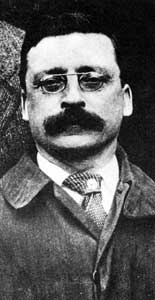5 January 2006 Edition
Arthur Griffith, Sinn Féin and Fine Gael

Arthur Griffith
The Sinn Féin centenary ended with an exchange of letters in the Irish Times provoked by the Fine Gael party's Arthur Griffith commemoration in Dublin's Mansion House at the end of November. The Irish Times published the first letter below from Micheál Mac Donncha of Sinn Féin on 1 December and the response from Fine Gael Councillor Brian Gillen on 7 December. Mac Donncha then responded with a letter, not published by The Irish Times, highlighting the historical inaccuracies in Gillen's missive. An Phoblacht here carries the correspondence in full, including the previously unpublished third letter
A Chara, - Enda Kenny's speech at the celebration of the centenary of Arthur Griffith's foundation of Sinn Féin made repeated reference to Griffith's non-violent policy (The Irish Times, November 28th). It is important to place that policy in context.
A month before Sinn Féin was founded, Griffith expressed his view in an editorial in the paper he edited, United Irishman. He wrote that the paper "has never advocated armed resistance because — and only because — it knows that Ireland is unable at the present time to wage physical war with England. But it has maintained and always shall maintain the right of the Irish nation to assert and defend its independence by force of arms — a right which no human being to whom God has given the ordinary complements of intelligence and honesty can venture to deny."
A failure to contextualise, given limited time at such an event, may be excusable. But surely, in the context of a Sinn Féin commemoration, the Fine Gael leader's vehement opposition to even very limited participation of MPs from the Six Counties in the Dáil, sitting in committee, must baffle any human being with "the ordinary complements of intelligence and honesty". Is mise,
Is mise,
Mícheál Mac Donncha,
Cill Bharróg,
Baile Átha Cliath.
Madam, - It was disappointing, though not surprising, to read Micheál Mac Donncha's attempt to "contextualise" Arthur Griffith's commitment to non-violent politics (December 1st).
I assume he was trying to establish a direct link between the Sinn Féin party founded by Griffith in 1905 and the current holders of the franchise -- who, as we all know, wholeheartedly endorsed the bloody, politically futile 30-year campaign of violence directed by the Army Council of the Provisional IRA.
In relation to the 1904 Griffith quotation, taken by Mr Mac Donncha from Griffith's United Irishman newspaper, on the right of the Irish nation to engage in armed resistance against the British, it is worth recalling that the Provisional IRA campaign of violence was opposed by the vast majority of the Irish nation, as shown by the lack of electoral support for Provisional Sinn Féin throughout the Troubles.
At a personal level, Arthur Griffith was primarily responsible for the effective functioning of the First and Second Dáils, in the midst of the turbulent War of Independence. His record of achievement stands in stark contrast to that of Provisional Sinn Féin. This political party doesn't sit at the House of Commons, yet claims over £500,000 sterling in expenses annually, and shares responsibility, with the DUP for the ongoing suspension of the Stormont Assembly. Ideologically dormant during what the Provisional Movement describes as the "struggle", Provisional Sinn Féin only ever acted as a doormat for the Army Council of the Provisional IRA.
Furthermore, Mr Mac Donncha, in his "contextualising", omits the fact of Griffith's non-membership of the Irish Republican Brotherhood, unlike most of the other senior figures of the War of Independence. How does this compare with the curriculum vitae of a senior Provisional figure such as Gerry Adams, who has never admitted to his decades-long membership of the Army Council of the Provisional IRA?
In several critical respects, therefore, Arthur Griffith had little in common with Gerry Adams, other than facial hair.
Yours, etc,
Cllr Brian Gillen,
Fine Gael, Dublin South-East, Leicester Avenue, Dublin 6.
A chara, Fine Gael Councillor Brian Gillen's purpose (December 7th) seems less to put "clear blue water" between Arthur Griffith's Sinn Féin and the Sinn Féin of 2005, than to distance Griffith from the Irish Republican Brother-hood and Irish Republican Army of his own day. The facts do not support the councillor's case.
Contrary to Cllr Gillen's contention, it is generally agreed by historians that Griffith was indeed a member of the IRB, though not so later in his career. His paper United Irishman was funded by the IRB. Griffith joined Óglaigh na hÉireann (the Irish Volunteers) on their foundation in 1913. While he opposed the idea of an insurrection in 1916 and assisted Eoin Mac Néill in trying to countermand it, once it began he offered to take part but was requested by the republican leadership to take a back seat as his propagandist talents would be needed after the Rising.
Griffith played a central role in the First and Second Dáil but Cllr Gillen omits to mention the armed suppression of those democratically-elected assemblies by the British Government, making armed conflict inevitable. Griffith and his fellow TDs took the same oath to the Irish Republic as that taken by IRA Volunteers. When British Prime Minister Lloyd George offered talks with the pre-condition of the IRA handing up arms to the British, acting President Griffith refused this offer as he said it would amount to surrender.
As for Cllr Gillen's criticism of modern Sinn Féin for not participating in the Westminster Parliament, this was a cornerstone of Griffith's policy. Is Cllr Gillen, like the Minister for Justice Michael McDowell, advocating that Sinn Féin MPs should take seats in Westminster?
Is mise,
Mícheál Mac Donncha,
Cill Bharróg,
Baile Átha Cliath.
